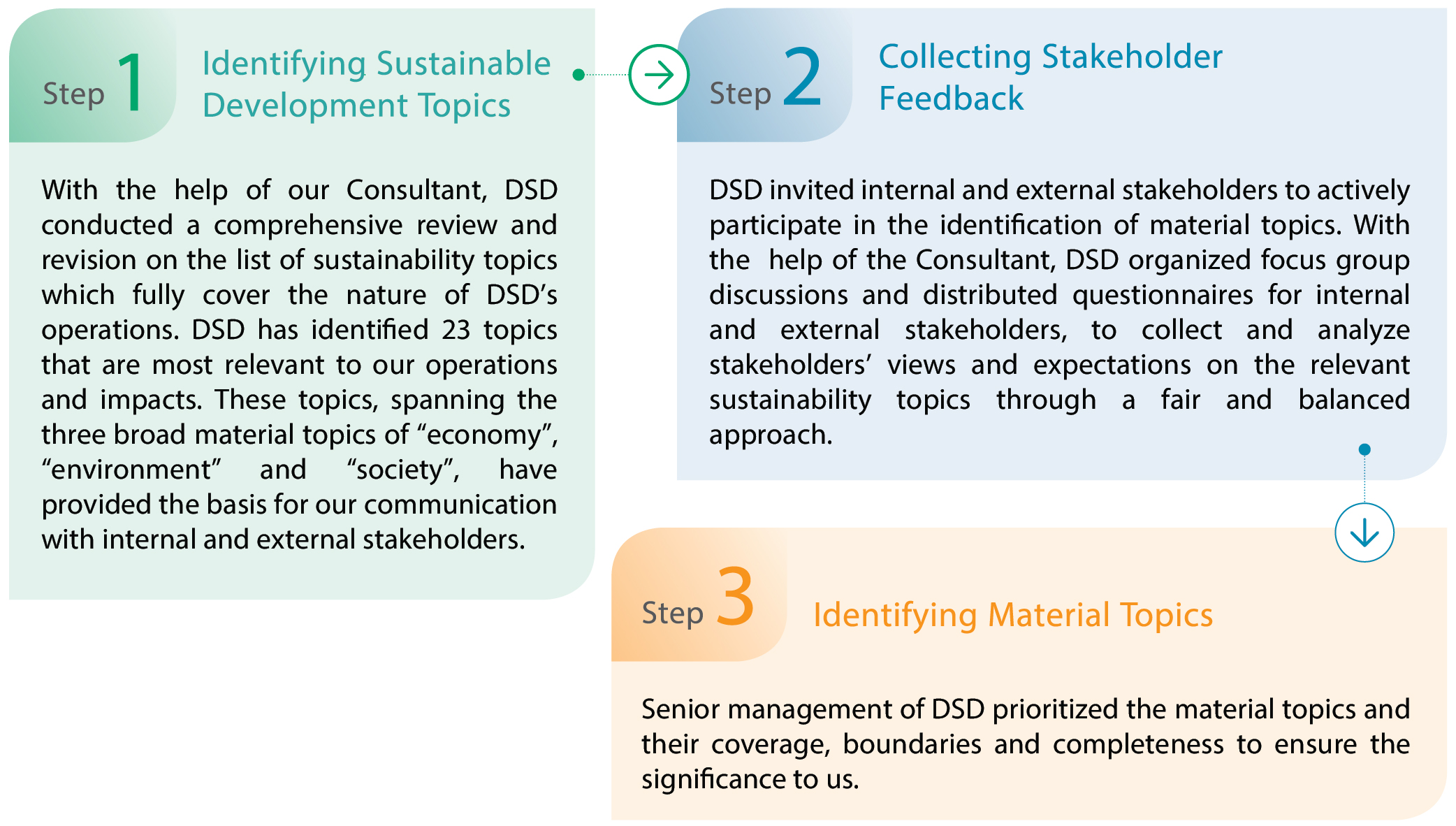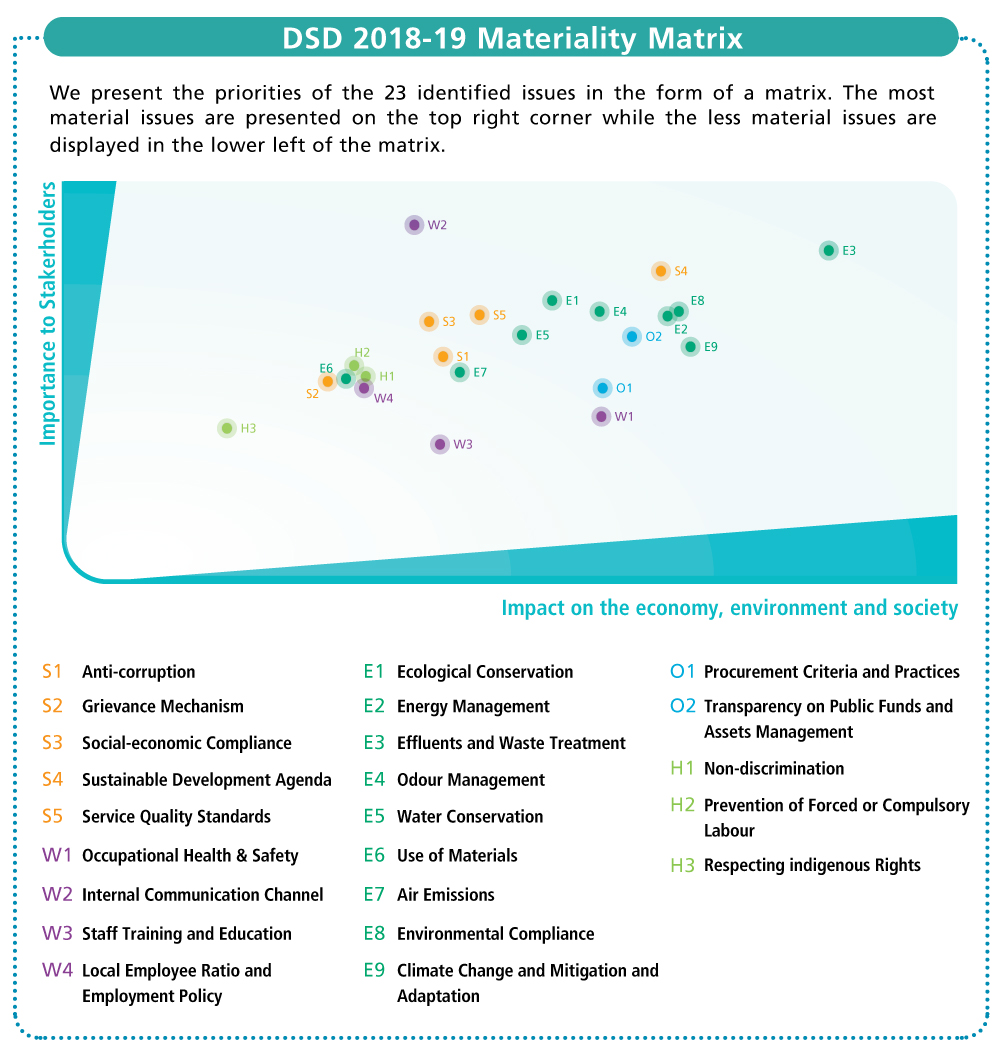Engagement Approach
Stakeholder inputs are valuable to DSD's sustainable development. Stakeholder engagement enables us to understand the environmental and social impacts of our operations and inform the issues our stakeholders are most concerned with in order to address their expectations. We have identified key stakeholder groups who have a significant impact on DSD's operations or those who could be significantly affected by our operations4, to understand their concerns. Stakeholder groups, including DSD staff, suppliers, contractors/consultants, legislators and local district councilors, academia groups/professional bodies, the general public, green groups and other governmental departments5, are invited to express their opinions and expectations to us.
Materiality Assessment
DSD conducts a comprehensive materiality assessment every year, with a view to identifying our shared economic, environmental and social concerns with stakeholders, and enabling us to focus the content of our sustainability reports. The materiality assessment is carried out based on the GRI Standards to identify the material topics that pose greater impacts on us and our stakeholders. The 2018-19 materiality assessment process consists of the following three major steps6:
Materiality Matrix
During the reporting period, a total of 356 stakeholders participated in the questionnaires or focus group discussions and provided us with feedbacks on the five major aspects of this Report including: environmental performance, social responsibility, staff welfare and development, operational performance and human rights protection.
We have identified 23 issues in the materiality assessment. The global warming has brought about extreme weather to Hong Kong in recent years, the impact of typhoons and torrential rains is closely related to DSD's river works and flood control measures. Therefore, we included a topic of “Climate Change and Mitigation and Adaptation”. In addition, DSD, as a governmental department, is responsible for reporting to the stakeholders on the development of public policies in a timely manner; hence, we included the topic of “Sustainable Development Agenda”.
During the reporting period, we conducted a survey with 260 external and 96 internal stakeholders to prioritised the identified material issues and discuss the material issues with stakeholders in the focus groups. Based on the outcomes from the focus groups and questionnaires, a materiality matrix is formulated. This year, a total of 18 issues were prioritised as material for DSD to address and report on.
A total of 18 material topics are covered in this Report and their corresponding boundaries are tabulated below:
| Material Issues8 | Topic Boundary7 | |
|---|---|---|
| Within DSD | Outside DSD | |
| Anti-corruption | ✔ | ✔ |
| Social-economic Compliance | ✔ | ✔ |
| Sustainable Development Agenda | ✔ | ✔ |
| Service Quality Standards | ✔ | ✔ |
| Ecological Conservation | ✔ | ✔ |
| Energy Management | ✔ | ✔ |
| Effluents and Waste Treatment | ✔ | ✔ |
| Odour Management | ✔ | ✔ |
| Water Conservation | ✔ | ✔ |
| Air Emissions | ✔ | ✔ |
| Environmental Compliance | ✔ | ✔ |
| Climate Change and Mitigation and Adaptation | ✔ | ✔ |
| Occupational Safety & Health | ✔ | ✔ |
| Internal Communication Channel | ✔ | |
| Staff Training and Education | ✔ | ✔ |
| Local Employee Ratio and Employment Policy | ✔ | |
| Procurement Criteria and Practices | ✔ | ✔ |
| Transparency on Public Funds and Assets Management | ✔ | ✔ |
4 102-42
5 102-40
6 102-43
7 102-46
8 102-47
Regular Engagement
Engaging stakeholders at DSD is an ongoing process that helps us to continuously update the sustainability issues that should be of the greatest concern. To this end, we have established multiple channels to communicate with stakeholders regularly on matters relating to projects, daily operations and our development approaches; all listed in the table below. The concerns raised during these regular exchanges together with our responses are reflected in this report. For details of the engagement, please refer to Chapter 7 Stakeholder Engagement Activities.
| Key Stakeholders | Engagement Channels9 | Key Concerns10 |
|---|---|---|
| DSD Staff |
|
|
| Suppliers |
|
|
| Contractors and Consultants |
|
|
| Legislators and Local District Councilors |
|
|
| Academia Groups and Professional Bodies |
|
|
| General Public |
|
|
| Green Groups |
|
|
| Other Governmental Departments |
|
|
9 102-43
10 102-44




